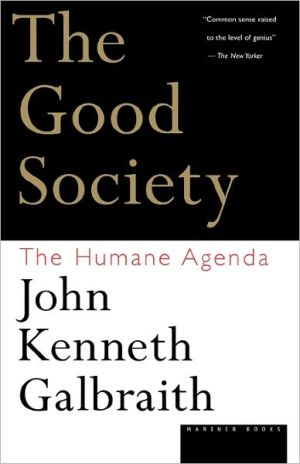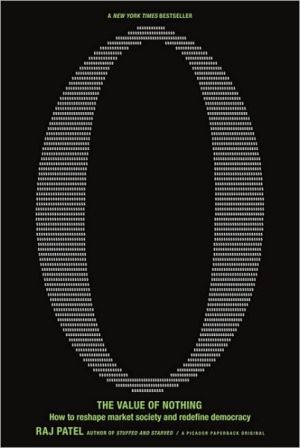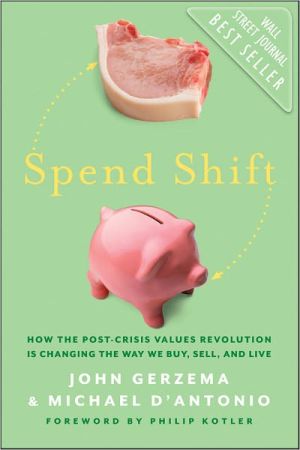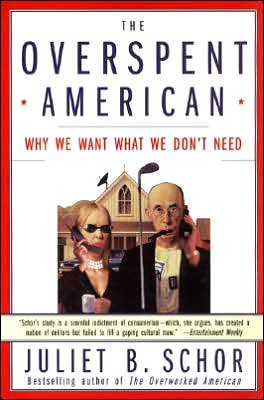The Good Society: The Humane Agenda
This compact, tightly argued, and eloquent book is the quintessential John Kenneth Galbraith, the manifesto of the "abiding liberal." In defining the characteristics of a good society and creating the blueprint for a workable agenda, Galbraith allows for human weakness without compromising a humane culture, and recognizes barriers that hinder but do not defeat a responsible, stable, and hopeful future.
Search in google:
This compact, tightly argued, and eloquent book is the quintessential John Kenneth Galbraith, the manifesto of the "abiding liberal." In defining the characteristics of a good society and creating the blueprint for a workable agenda, Galbraith allows for human weakness without compromising a humane culture, and recognizes barriers that hinder but do not defeat a responsible, stable, and hopeful future. Publishers Weekly In this carefully reasoned manifesto, eminent economist Galbraith outlines his vision of the good society. To prevent recurrent stagnation and unemployment, he advises active intervention by the state. Arguing that the federal deficit is being used by conservatives as a pretext to attack social programs, he recommends a progressive income tax that eliminates tax concessions for the affluent, as well as ending government subsidies for business ("corporate welfare") and stopping the vast payments to the armaments industry. His version of the good society also encompasses a strong environmental movement, a more open immigration policy and a sturdier safety net for the poor and disadvantaged. Though there are few surprises here, those who agree with the pragmatically liberal Galbraith that both socialism and complete surrender to market forces are irrelevant as guides to public action will find his primer a useful springboard for planning the future. (Apr.)
1The Good Society12The Wider Screen63The Age of Practical Judgment144The Social Foundation235The Good Economy336Inflation437The Deficit508The Distribution of Income and Power599The Decisive Role of Education6810Regulation: The Basic Principles7511The Environment8212Migration8913The Autonomous Military Power9714The Bureaucratic Syndrome10415Foreign Policy: The Economic and Social Dimension11016The Poor of the Planet I: The Shaping History12117The Poor of the Planet II: What the Good Society Must Do13018The Political Context138Index145
\ From the PublisherMarch 1, 1996\ "Nearing 90 years of age and with 30 books to his credit, Galbraith is in a position to sit back and reflect. Contemplating what kind of society we can have and what kind we seem to want to have, he tries to reconcile the differences. Galbraith holds out—and holds out for—"the good society." He knowingly appropriates this frequently used phrase, acknowledging that it was first used in the 1920s by Walter Lippmann in his same-titled "defense" of the principles of liberalism. Timed to stir both voters and candidates, The Good Society calls for compassionate social responsibility. Galbraith suggests that the current political agenda that attacks the poor received the explicit support of less than one-fourth of the electorate, and he makes the case that the "haves" can still have it without having to have it all. Because of who Galbraith is, this will be an important book, and libraries wanting to strengthen collections to cover topics relevant to the presidential election campaign may want extra copies." Booklist, ALA\ \ \ \ \ \ Publishers Weekly\ - Publisher's Weekly\ In this carefully reasoned manifesto, eminent economist Galbraith outlines his vision of the good society. To prevent recurrent stagnation and unemployment, he advises active intervention by the state. Arguing that the federal deficit is being used by conservatives as a pretext to attack social programs, he recommends a progressive income tax that eliminates tax concessions for the affluent, as well as ending government subsidies for business ("corporate welfare") and stopping the vast payments to the armaments industry. His version of the good society also encompasses a strong environmental movement, a more open immigration policy and a sturdier safety net for the poor and disadvantaged. Though there are few surprises here, those who agree with the pragmatically liberal Galbraith that both socialism and complete surrender to market forces are irrelevant as guides to public action will find his primer a useful springboard for planning the future. (Apr.)\ \ \ Library JournalIn this slim volume, eminent economist Galbraith tackles the question of what, exactly, is a "good society." Most Americans would agree with the components of Galbraith's "good society": economic growth; universal access to education; and protection for the young, old, disabled, and the environment. He parts company with the pundits in his disbelief that the "good society" can be obtained through adherence to a particular ideology, arguing instead that rigid philosophies must be abandoned and each issue considered in all its complexity. With his usual elegance and common sense, the Harvard professor emeritus discusses such issues as NAFTA, the balanced budget amendment, and the flat income tax, always focusing on their economic ramifications and effect on the common good. You will find no numbers or statistics here-just an optimistic, yet realistic, philosophical discourse on social welfare, economics, and politics in the 1990s. Recommended for academic and large public libraries. [Previewed in Prepub Alert, LJ 12/95.]-Eris Weaver, Marin Inst., San Rafael, Cal.\ \








